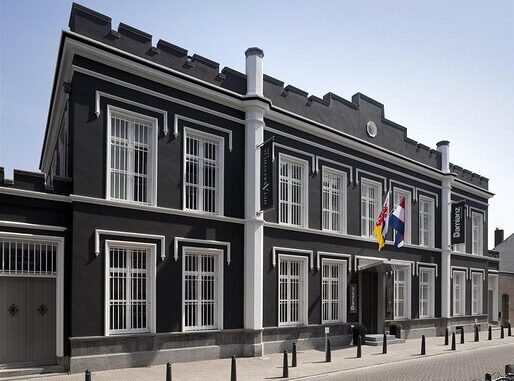
The Two Legends J.B. Mauney and Lane frost buy old hotel and transform them into 139 micro-apartments for the homeless
In the heart of a bustling city, where skyscrapers cast long shadows and the hum of traffic is a constant backdrop, two legends from the world of rodeo, J.B. Mauney and Lane Frost, embarked on a venture that would transform their legacy into something far removed from the bull-riding arena. These titans of the sport, known for their grit and daring on the rodeo circuit, decided to take on a different kind of challenge: providing shelter for the homeless.
Their story began when Mauney and Frost, having retired from their adrenaline-fueled careers, sought a new way to make a meaningful impact. They had both seen the harsh realities of life on the road and the struggles faced by those less fortunate. While they were admired for their feats on bulls like “Bushwacker” and “Red Rock,” they wanted to channel their energies into something that would address the very real issue of homelessness.
The opportunity came when they stumbled upon an old, dilapidated hotel in the heart of the city. Once a grand establishment, it had fallen into disrepair, its elegant façade marred by years of neglect. The hotel, which had been vacant for over a decade, seemed to be a perfect candidate for transformation. Its crumbling walls and outdated interiors belied a potential that Mauney and Frost immediately recognized.
With a vision in mind, they purchased the hotel and began their ambitious project: converting it into 139 micro-apartments designed to provide affordable housing for the homeless. This was no ordinary renovation. Mauney and Frost, though far from experts in real estate development, approached the project with the same determination and strategic mindset they had applied to their rodeo careers.
The transformation was no small feat. The building’s infrastructure needed a complete overhaul. They brought in architects, contractors, and engineers who were equally committed to the mission. Their goal was to create small, functional living spaces that would offer dignity and comfort to their future residents. The design incorporated modern amenities while maintaining a warm, welcoming atmosphere.
Inside, the micro-apartments were designed with efficiency in mind. Each unit was equipped with a small kitchenette, a compact but functional bathroom, and a cozy living area. The furnishings were minimalist yet comfortable, ensuring that each resident would have a space to call their own. The building’s communal areas included a shared lounge, a laundry facility, and a community garden, fostering a sense of community among the residents.
Mauney and Frost were hands-on throughout the renovation process. They made frequent visits to the site, overseeing progress and ensuring that their vision was being realized. Their dedication was evident not only in the physical transformation of the hotel but also in the way they engaged with the community. They organized local fundraisers, enlisted the help of volunteers, and even held events to raise awareness about the project.
As the renovation neared completion, anticipation grew. The old hotel, once a symbol of decay, was now a beacon of hope. The grand reopening was a celebrated event, attended by city officials, local businesses, and community members who had supported the project. Mauney and Frost, who had become local heroes for their efforts, were there to welcome the first residents.
The impact of their work was immediate and profound. The micro-apartments provided more than just a roof over people’s heads; they offered a sense of stability and a fresh start. Many of the new residents were individuals who had experienced long periods of homelessness, struggling with the harsh realities of life on the streets. For them, the new apartments represented a turning point.
One of the first residents, a middle-aged woman named Linda, shared her story at the opening ceremony. Having faced years of instability and hardship, she described how receiving her own apartment gave her hope and a sense of belonging she hadn’t felt in years. Her gratitude was a testament to the difference that Mauney and Frost’s project had made.
The success of the hotel transformation did more than provide immediate relief. It sparked a broader conversation about homelessness and affordable housing in the city. Mauney and Frost became advocates for similar initiatives, using their platform to encourage other investors and community leaders to take action.
The legacy of J.B. Mauney and Lane Frost extended far beyond their rodeo achievements. They proved that the same tenacity and spirit that had driven them in the arena could be applied to solving some of society’s most pressing issues. Their project not only gave hope to many but also inspired others to think creatively and compassionately about how to address homelessness.
In the end, the old hotel was more than just a building. It became a symbol of transformation and a testament to the power of using one’s influence for good. Mauney and Frost, with their larger-than-life personas and unwavering commitment, had shown that true legends are defined not just by their triumphs but by their contributions to the betterment of others’ lives.
Leave a Reply